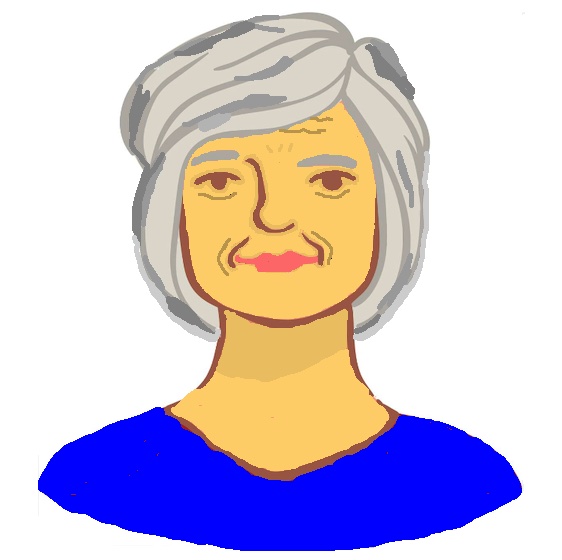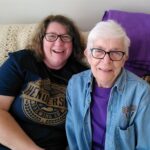I am 58. Therefore, I think that I can, at last, offer advice on turning 50, for all those women who fear it, and on being over 50, for those women experiencing it and struggling.
I have heard so many women say they dreaded turning 40, and I just didn’t get it: at 40, you’re still young, your body and mind are still somewhat pliable, you have the wisdom of the years but, for the most part, you aren’t being asked “Would you like the senior citizen discount”, you are probably still working in your chosen profession, you can still do most of the activities you love, etc. If you are a parent, your kids are getting more and more self-reliant, and perhaps not even at home anymore, so you’ve got more time to do what you love.
In short, I think women who dread turning 40 are silly.
But 50 is different and in many ways, yes, worth dreading.
Either when you turn 50 or in your 50s, your physical issues aren’t small anymore, something you can take care of with three Advil instead of two. You started coloring your hair in your 40s and it still looked natural, but now – yeah, everyone knows you are coloring your hair, and that really, you are gray – and not a beautiful white-ish gray but a mix of shades of gray that look like dishwater. The lines and sags on your face are more and more pronounced and it’s going to take way more than a good night’s sleep and an at-home facial to make your face look better. You are probably putting on a LOT of weight. You have had to abandon clothes and activities you love, both because of the weight and your increasing physical limitations. Your knees aren’t just creaking, they are hurting. Your back may hurt in ways it never did before. Pulling a muscle isn’t something you do only when you play a sport – you do it when you reach too strenuously for a can in the back of a cabinet or sleep in a weird position. The doctor has put you on medicine for high blood medicine. You’re leaking from various orifices – don’t say that you aren’t. And, oh, the skin tags.
You are going through perimenopause, if you didn’t finish it in your 40s, and it brings unique physical and mental challenges to every woman, so much so that advice on how to deal with it is almost useless: you might gain weight, or not. You might start having headaches or the headaches you’ve been having since you were a teenager will stop. You might lose your sex drive, you might not. You might not be able to sleep, you might now want to sleep all the time. You might have brain fog or you might find yourself hyper-focused at times in a way you never were before. Your periods will become infrequent and, when they do happen, it will be a crime scene – or not. And it might be just a blip and you may have little to no issues at all.
You’ll get overlooked when standing at a bar to order a drink. You’ll get sexually harassed by older men who think you will be grateful for the attention. You’ll be the target of thieves in parking lots and on sidewalks and on public transport in broad daylight in a way you never were before – you look like an easier target than others.
Most of you won’t look like Helen Mirran – who as I publish this, is 78 and looks AMAZING. Or Halle Berry, who as I write this is 57 and looks like a goddess. Or Annette Bening, who is 65 and I would LOVE to look as good as her.
And some of you are in the deep throes of caregiving for a parent, and you are EXHAUSTED. You are overwhelmed. No one prepared you for this role, the stress and the time. There are no nonprofits emerging to help you cope. You can’t get a day off from obligations to a parent or an adult child or a grandchild. Your situation deserves a whole ‘nother blog of its own.
So pardon me if I cringe when people, usually people younger than me or MEN retiring with a huge amount of money, write a blog or go on TV and talk about finding “special joys” at being in your 50s.
And forget books for advice. Here, let me tell you the theme of all of them: How to step aside. They are all about how it’s time to abandon your career, let go of things you love, and take up knitting.
But with that rant said… are there “special joys” in your 50s?
If you don’t consider all those people who have to take over parental duties for their grandkids because the adult son or daughter is useless, or those who have to do caregiving for an adult loved one… or people on the verge of losing their homes… in other words, if you consider only those people who are privileged to have time for themselves, the answer is yes, there are some special joys.
I think for women in their 50s who have kids, the answer is usually yes, there are special joys, because those kids are adults or very close to adulthood, and they are either out of the house or getting close. You get to do things together that don’t involve you taking care of them. And you probably get to enjoy a grandchild or two, and spending time with grandchildren is very different than parenting a child.
But if you are childless, it’s not as easy to say what your “special joys” in your 50s will be. They certainly aren’t going to be automatic with age – you will have to work for them.
Maybe you have worked all your life and have loved your career, but have been forced out of it because of age discrimination or because, physically or mentally, you really can’t do it anymore. Or there was an activity that you did outside of work that you have had to quit for similar reasons. In either case, that activity is something that has inspired you, that you have loved being identified with and that you have loved doing. And it’s gone. That is a significant loss. Very few professionals who had to give up their beloved careers find something new that’s as fulfilling. It can be every bit as hurtful and significant as losing someone you love. It’s been my biggest struggle. You get no flowers of sympathy, BTW. In fact, if you talk about it, your friends won’t want to be around you anymore.
If you find yourself in that same situation, or you are struggling with what to do in your new free time, or your kids and grandkids aren’t enough to look forward to for the next 40 or so years, then the rest of this blog is for you.
If you, like me, never prepared for a life after your profession that was central to how you identify, then you have to go on a journey of both acceptance and in finding something meaningful to fill your time. You have to accept that you probably are never going to find something that gave you the thrill or satisfaction of your career or that all-consuming physical activity you can’t do anymore, but if you are willing to look and to try and to experiment, you will find something that won’t just fill your hours, it will bring you at least some joy. And some joy is better than nothing. Some joy is more than a lot of people have.
Even if you have to get a full-time job that merely pays the bills, life now, without your career, will give you more time to do activities you enjoy, or to explore new things: learn another language, travel, go to live performances, rent a cabin somewhere beautiful, take a class, learn to play piano, paint and draw, take the Motorcycle Safety Foundation basic rider course and get your motorcycle license, try out for a play at the community theater and get on stage like you always dreamed, and on and on. If you don’t know where to begin, then get a notebook and start writing down the things you dreamed of doing as a child, no matter how crazy, and the things you dreamed of doing as a teen, and as a young parent, and on and on. Update that list and look at it frequently. Think about what you could actually do now, and then do NOT hesitate in trying to do it.
At this stage in your life, you are in a fantastic position to be on the board of directors of a nonprofit, to be on a city or county commission, or to run for office. Your leadership is needed. Your life experiences are needed. Go to city council and county commission meetings, and to city and county committee meetings, and go to events by nonprofits that have a mission you care about, and explore what you think might be worth your time. Might take months or might take a couple of years for you to figure out what you want to pursue. But if there is anything at all you think you want to be a part of, do NOT let anyone discourage you: no matter what your background is, at 50, you have a lot to offer these committees and boards. Get in there and take up space!
Have you thought about the Peace Corps? They love “mature” volunteers. Most Peace Corps two-year roles are to teach English, but there are other roles as well, like community health educators, people to lead youth in sports programs and agricultural extension volunreers. Peace Corps requires a two-year commitment, but there’s also Peace Corps Response, which is a commitment of just three to 12 months.
You don’t have to go outside the USA to volunteer: you could volunteer on a house build with your local chapter of Habitat for Humanity (no construction experience required), or on a house repair or yard cleanup for a vulnerable homeowner for Habitat for Humanity, or help in the local ReStore, which helps fund Habitat for Humanity. You could volunteer with Meals on Wheels. You could tutor a young person through the nearest public school. You could mentor a young person via Junior Achievement or 4-H. You could take on a substantial mentoring role via the National CASA/GAL Association for Children, which supports and promotes court-appointed volunteer advocacy for children and youth who have experienced abuse or neglect. Here’s more about finding a volunteering role.
Don’t try something once and give up. Don’t give up the first time you have a bad day or someone makes an insulting comment or an obstacle gets thrown in your way. Give activities time to be enjoyable.
Get an Instagram account and start taking photos and sharing them – and scan old photos and share those too.
Get your DNA test done with Ancestry and then fill out your family tree, then share it with your family. Even if they don’t appreciate it now, they will eventually, as they get older.
As you experiment and explore, remember:
You have nothing to prove to anyone. You have no one to impress. If you still think you do, then work on that.
- You can choose your battles. You can say no to someone itching for conflict. You can say, “I am too old to still care about/deal with this” and walk away, even to family members. Give in to your instinct for who and what is worth your time and who and what is not.
- If you are still afraid of stillness, work on that. Because this is your time to embrace and enjoy stillness. And stillness is wonderful.
- The most important key to happiness in your 50s: be curious. Stay curious. Anything you can learn about is worth learning about.
And now the practical stuff:
Whether you are happy about being in your 50s, tepid about it, or devastated about it, there is something everyone should do: look at your finances, talk to a financial advisor (your bank or credit union can help) and make a plan for where you are going to live, and how, in your 60s, 70s and beyond.
It’s not too late to talk to a financial advisor about long-term disability insurance, life insurance and retirement savings. Get your money out of a bank and into a credit union and then ask for their assistance. Or contact Calvert or Thrivent.
Downsizing to a smaller home now will be easier than doing it later, and the money savings will be enormous. If not now, give yourself a deadline for downsizing: 65? 70? When you are no longer working full-time?
Some people pick their 50s to start planning to move abroad for the next 20 years to somewhere far cheaper, like Mexico or Belize. Their plan is to be there for 10 or 20 or 30 years, and then return to the US for the ultimate retirement, the one where you sit in a small apartment all day, possibly with a roommate, watch a lot of TV, play a lot of Bingo and wait to die. What I have read over and over: don’t wait until you have trouble with mobility or might be having memory problems. Do it when you are young enough to still drive, still walk and do a bit of hiking, still able to swim, etc.
If your home has a spare bedroom that you can clean out completely, leaving nothing but a good bed, an empty closet and an empty set of drawers, consider renting it out for some extra cash. Put it on Air B & B or a similar service or offer it as a long-term rental on Zillow.
Make every medical appointment you can and need, that you can afford. Get every vaccination you are eligible for. Get your latest glasses prescription. Get hearing aids while they are somewhat covered by your insurance. Get what you need now – because later, you may not have an option.
Doing the practical stuff isn’t just what you need to survive; it’s what you need to have the space and time to continue to do things you enjoy and to explore your curiosity.
I’ve got less than two more years in my 50s. And then comes 60. And I am dreading it. Because I know the health problems will be worse. I know how society treats me will be worse. I know my limitations will be greater.
I just hope I stay privileged and curious.













Leave a Reply